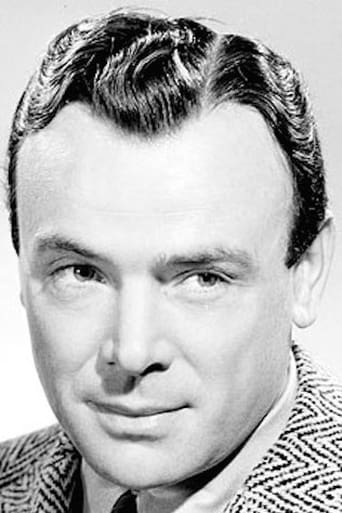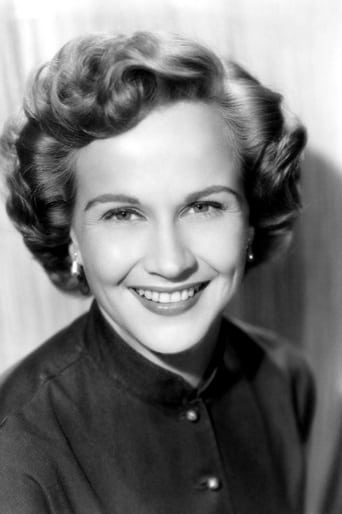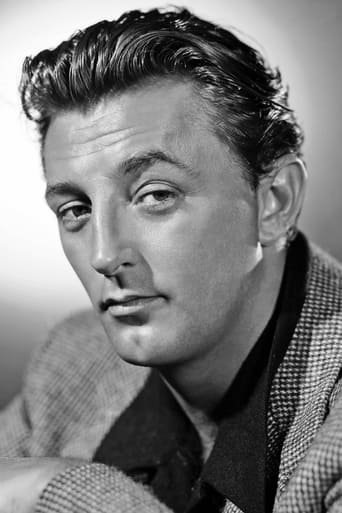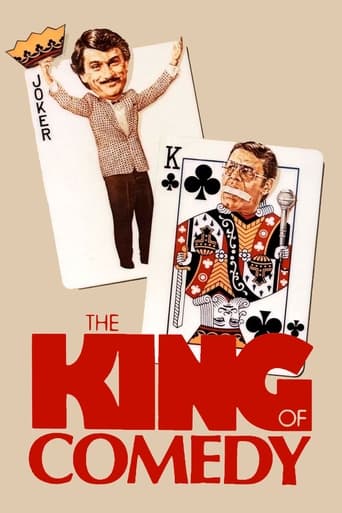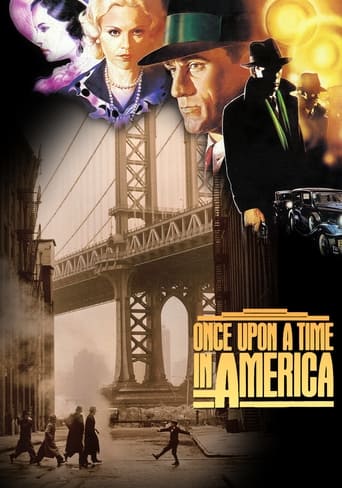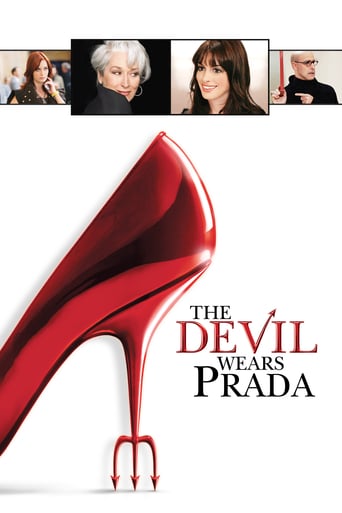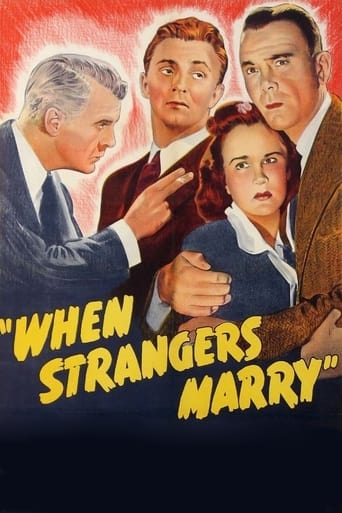
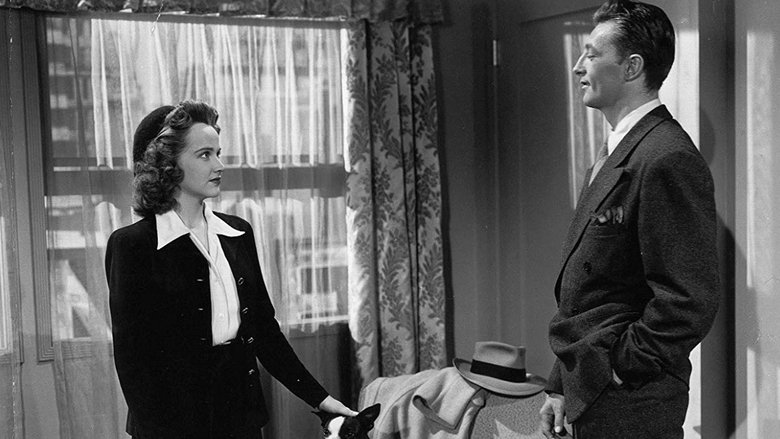
When Strangers Marry (1944)
A naive small-town girl comes to New York City to meet her husband, and discovers that he may be a murderer.
Watch Trailer
Cast
Similar titles
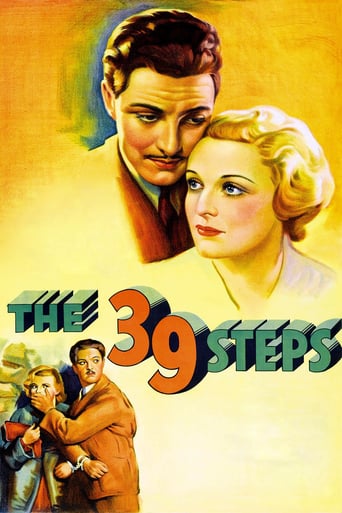
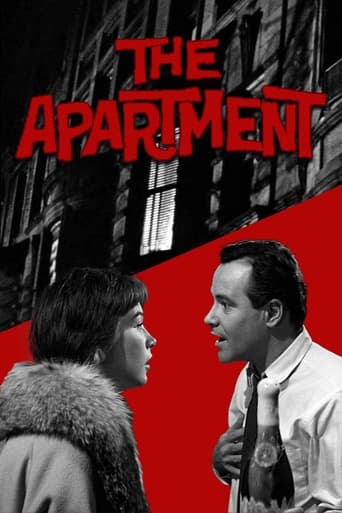

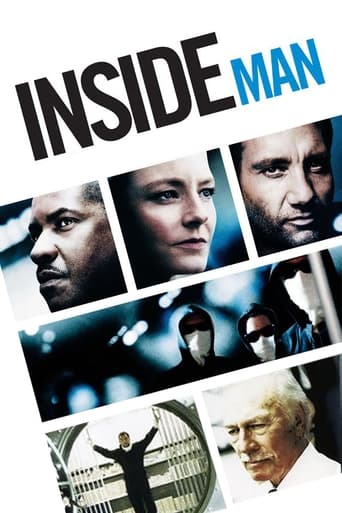
Reviews
Just what I expected
It's funny watching the elements come together in this complicated scam. On one hand, the set-up isn't quite as complex as it seems, but there's an easy sense of fun in every exchange.
Exactly the movie you think it is, but not the movie you want it to be.
An old-fashioned movie made with new-fashioned finesse.
Film noir at the time wasn't the solid genre we can identify in retrospect, and didn't even have the name yet, but there were many semi-conscious efforts like this. It is wholly ordinary in the long run, probably echoing the previous year's Shadow of a Doubt; she has married a man who is really a stranger to her and may be the killer sought by police.The interesting thing is getting to identify strange dreams filmmakers were having and weren't quite sure what about. One thing was for sure; anxiety in the air, a sense of hidden machinations behind the world.Two aspects strike some spark here, both better refined elsewhere but worth mentioning.Fluid identities; there is a second man involved, also a salesman, the same build, same height, same suit as who police are looking for, also vying for affections of the innocent country-girl fresh to New York, who might have been the husband if a letter had reached her in time. Both men are worldly and have a hint of darkness in the eye, between them is the wide-eyed girl, eager to love and trust, but suspecting something is not quite right here and this is not the same kind of life as back in Ohio.The second is synchronous overlaps; this is where reality acquires shades of meaning based on internal life the viewer knows. Look for the scene where she opens the blinds in her hotel room to the New York night and a neon sign flashes 'DANCE' in her face. Swing music reaches out to her from somewhere, suddenly a phone rings but she can't quite make out what is being said to her.The rest is a lot of wandering in and out of hotels, bus stations, cars, court-rooms, and even a black joint in Harlem. But is exhaustive, lacking any structure beyond attempts for a desperate getaway.Also notice the montage of superimposed shots from around New York; this would have been an avant-garde flourish 15 years ago, here it has saturated as low as a Monogram b-movie.
William Castle would of course go on to become best known for his gimmicky horror films; an oeuvre which includes the likes of House on Haunted Hill, The Tingler and Homicidal - but before then, he made a series of film noir/mystery thrillers; and When Strangers Marry is one of those. The film is only just over an hour long and I wouldn't be surprised to find that it was made as a 'B' feature for some bigger movie. However, in spite of that; the production values aren't bad and the cast all do well also. The plot is rather unlikely and focuses on the idea of a man and a woman getting married without really knowing each other. Millie Baxter is the female half of the equation; and she has been called, by her husband, to New York in order to meet with him. However, upon her arrival; he's not at the hotel, but by chance she is greeted by her old friend Fred Graham, who clearly carries a torch for her. Fred agrees to help her look for her husband and the pair begin tracking him across New York...but it soon becomes clear that there's something sinister surrounding his disappearance.This was an early film appearance for Robert Mitchum, and it's clear that the producers knew he was going to be a star, although his role here is a secondary one. He leads the film from the back and William Castle never misses a chance to give the actor a close-up. It's not the actor's best performance by a long shot, but it shows some early promise. Kim Hunter is the female lead and her role gives her a chance to retread some of the same ground of her debut feature, Val Lewton's masterpiece The Seventh Victim. As you would expect considering the length of the film, the story is very tight and there is little in the way of diversions from the main plot line. The main plot itself is just about good enough to hold interest for the duration of the film, although I can imagine it would become more than a little tedious if the film were longer. The ending features a twist in the story; and for my money it's a rather convenient one that doesn't really make sense. There are some attempts to explain it and the holes it creates could be patched up...but it requires the viewer to suspend some disbelief. Still, there's worse ways to spend an hour and this is a decent film.
Castle's third feature is an interesting case of talents in the bud. Previously he had been responsible for a bright Boston Blackie series entry with Chester Morris, and the less successful Klondike Kate (1943) with Tom Neal. When Strangers Marry (also known by the less accurate title of Betrayed) shows the director's increasing confidence as he ventures into the territory of the new film noir genre. He was also lucky in securing the services of a good cast: Kim Hunter, Dean Jagger and, in his first co-starring role, a young Robert Mitchum. One of the greatest noir stars, Mitchum is slimmer and perhaps more tentative here than he would be in later films, but still has enough presence and skill to make an impact, especially in the sweaty closing scenes. Already an experienced hand, Dimitri Tiomkin provided the music, and the result was an above average production from Monogram.Having said that, there's a certain peremptoriness to the film, making it not entirely satisfactory. The noir style, which thrived on inexpensive sets and the economic use of shadow, cheap location shooting and the like, is evoked by Castle rather than expressed in any thorough fashion. Castle's next film The Whistler (1944), on yet another miniscule budget, was much more effective in evoking a continuous mood of paranoia and doom from the haunted Richard Dix. Some successful scenes apart, (Millie's first night in the hotel, her Lewtonish night walk, her innocent suspicions in Paul's apartment), the present film rather clumsily bolts noir elements on to a standard suspense plot - one vaguely reminiscent of Hitchcock's Suspicion of three years before - rather than to let them arise naturally from situation and character. An example is Millie's night of disturbed rest in the hotel. Husbandless in her neon sign-lit room, drowned in shadows and fear, she is distracted by the repeated blaring of nearby dancehall before taking a fraught phone call from Fred (Mitchum). This scene has no real plot purpose except to show her loneliness and distress, and the expressionist images seem over emphatic. On its own it is startling and dramatic, but nothing more, a pool of hard noir in a more naturalistic film. Even less convincingly, as if it had never happened Millie then makes no move to change her room later the next day, and the music never occurs again (it would have made an excellent punctuation for any later confrontation with Fred, for instance). As an actress, Kim Hunter makes an effective noir victim, even if her trusting fragility needs a willing suspension of disbelief. Powell and Pressburger obviously recognised such sensitivity even in a poverty row product like this, for they shortly cast her in such films as A Canterbury Tale, of the same year, and then in A Matter of Life and Death (1946).A more serious plot flaw resides in the character of her husband Paul (Jagger). His personality and motives are shrouded in mystery throughout the film and, sadly, are not much clearer by the end. For a while this enigmatic man provides the narrative with a lot of useful suspense. The lack of resolution to his drama, while supplying the necessary twist as the truth is revealed, leaves the viewer with just too many questions to be comfortable. One misses even the rudimentary psycho-analysis which appeared in some noirs from this time, supposedly explaining the aberrant personality. Either elements of helpful exposition were jettisoned in the course of filming on a tight budget, or the writers (who included the excellent Philip Jordan, of Dillinger, Detective Story, Big Combo fame) thought they could get away with such a lacuna. The result is to reduce a happy ending to one where a married couple must still live on unresolved tensions, their determined contentment notwithstanding.For those interested in trivia there are some private jokes in the film. A 'Mr King' is paged at the hotel (the film was produced by the King brothers). More amusingly, Millie hands over a deliberately misleading picture to the investigating detectives, saying 'This is the man you want'. It is director Castle. Such gallows humour, and self-publicity, would manifest itself in a series of gimmick films for which he is better known, starting in the 50's...
Like My Name is Julia Ross, another quick-and-dirty damsel-in-distress movie, When Strangers Marry helped lay down the blueprints for what would come to be called film noir. Kim Hunter has just wed a patron (Dean Jagger) of the restaurant where she waited tables without knowing much about him; off on a vague business trip, he asks her to meet him at a New York hotel. His evasive actions are enough to raise suspicions even in a naive Ohio gal like her -- he makes her wander the streets of wartime Greenwich Village at night (as she did a year earlier in Val Lewton's The Seventh Victim). An old man-pal (the very young Robert Mitchum) happens to turn up to keep an eye on her strange marriage in the big bad city. But there are recurring links to the silk-stocking murder of a businessman in Philadelpia a few days before.... William Castle, best known as a 1950s schlockmeister (13 Ghosts, et al.) shows himself to be a keen apprentice here: There's a scene involving a glass-paned hotel mail chute that is almost Hitchcockian.
